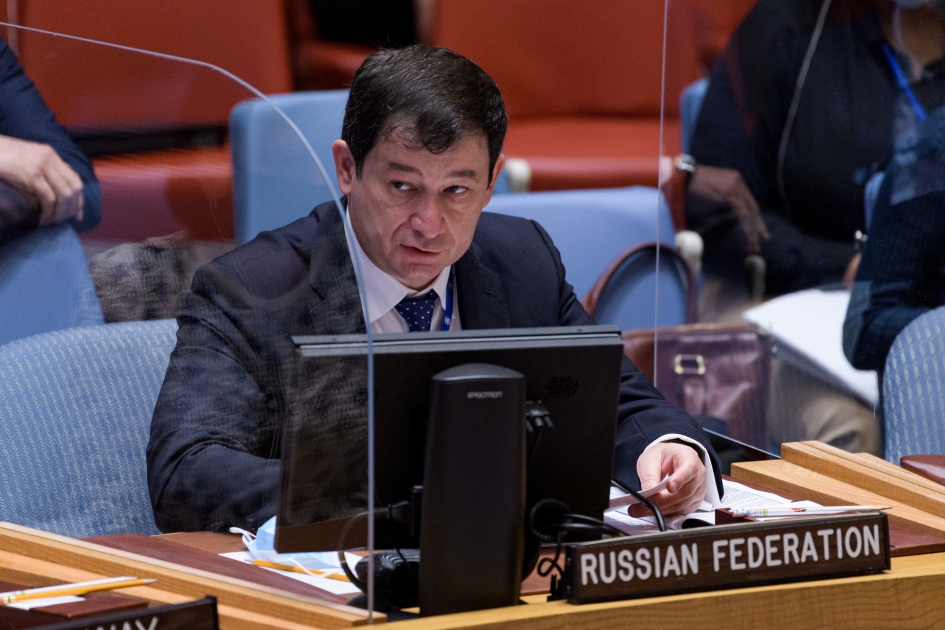Statement by First Deputy Permanent Representative Dmitry Polyanskiy at UNSC briefing "Threat posed by illicit flows of small arms and light weapons (SALW) in peace operations’"
Mr.President,
We thank Ms.Nakamitsu for the briefing. We closely followed the remarks by Lt Gen. Abdelgadir and Mr.Lochead.
We welcome that the Kenyan Presidency is convening this SC discussion of the issue of small arms and light weapons (SALW) in the context of peacekeeping operations rather than as part of disarmament agenda. We understand too well concerns of some states, first of all those in Africa, for whom the problems of illicit transfer of SALW are particularly urgent.
We believe biennial reports of the Secretary-General on SALW need to pay more attention to the peacekeeping-related issues. Besides, we have every reason to expect the reports to give more extensive coverage of such effective mechanisms in this area as the UN Programme of Action to Prevent, Combat and Eradicate the Illicit Trade in Small Arms and Light Weapons.
Mr.President,
Peacekeeping missions of the United Nations that hold corresponding mandates, play an important role assisting states in implementing DDR programs, recovering bodies that ensure legal order and the rule of law. While partaking in disarmament of the conflicting sides, disbanding their military units, and reintegrating former combatants in order to prevent recurrence of conflict, peacekeepers pursue a very important goal – they support the peace process, create conditions for political settlement, ensure safety of the population and the Blue Helmets themselves.
DDR strategies cannot be fully successful unless the sides reach resilient reconciliation based on confidence and backed by sufficient conditions for security and real opportunities for reintegration of the disarmed combatants in the emerging armed forces or reentry into civilian life.
Large stocks of uncontrolled SALW create impediments to ensuring safety of civilians and peacekeeping personnel. More broadly, it calls into question the very possibility of terminating the armed confrontation and creating conditions for achieving ultimate reconciliation by the sides.
We are convinced that responsibility for control of SALW traffic must rest upon governments of the states, at which territory SALW is located. In this regard, we deem it particularly important to carry out a security sector reform. Once done, it will not only help achieve national reconciliation, but also establish state security institutions that will be able to protect civilians effectively, control national territory, and counter terrorist groups. In order to accomplish this, the government needs to be able to form professionally trained and equipped armed forces.
In this regard, we would like to remind our colleagues in the Council of our position. We believe we need to readdress some countries’ sanctions regimes so that governmental troops of such states as e.g. the Central African Republic, Sudan, South Sudan, Somalia were duly armed and trained to maintain legal order.
Mr.President,
We see no other context for discussing SALW in the Security Council than peacekeeping. Various general topics, e.g. sustainable development, gender, or climate change that our colleagues refer to here are not fit to host a discussion of SALW. We doubt that such discussions may nave any added value – especially here in the Security Council, because it is the General Assembly that remains the priority platform for addressing SALW-related issues.
It is the General Assembly that hosts regular, open, and comprehensive work on the mentioned Programme of Action, which is the only specialized global document in this area. We appreciate efforts of the Kenyan side to convene in July this year the Seventh Biennial Meeting of States (BMS7) on the implementation of the PoA.
In practical terms, we believe it important to promote implementation of the BMS7 final document, first of all at national levels. We must not forget that countering the illicit trafficking of SALW, ensuring safe storage of its stockpiles, and eradicating the excesses are a prerogative of states and an integral part of their sovereignty. Russia has elaborated advanced national legislation in the area of countering the illicit trafficking of SALW. We stand ready to share our experience and best practices with the interested states.
Thank you.
